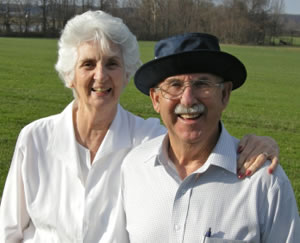- Posted April 28, 2016
“B” Alzheimer’s Aware
By
Kimberly Beauchamp, ND

Results show that B-vitamin supplementation can slow the atrophy of specific brain regions
Related Topics
Taking a B-vitamin complex might help stop Alzheimer’s disease before it starts, according to a study in the Proceedings of the National Academy of Sciences.
Alzheimer’s disease is a type of dementia characterized by areas of tangled nerve fibers and clumped proteins called plaques in the brain. The most common form of dementia, Alzheimer’s, can affect memory, mood, learning, communication, and thinking/reasoning (cognition). Because it’s a progressive disease, the symptoms worsen over time.
Since there is no cure for Alzheimer’s, most of the treatments focus on controlling the symptoms and slowing disease progression.
Stop it before it starts
Several studies have demonstrated a connection between high blood levels of a substance called homocysteine and different types of dementia. B vitamins may lower homocysteine levels, but they haven’t always been successful in clinical trials at improving brain function in people with cognitive impairment. The study reported on here investigated the effect of a B-complex supplement on brain shrinkage, homocysteine levels, memory, and overall functioning in 156 people aged 70 years and older with mild cognitive impairment (a risk factor for developing Alzheimer’s disease).
Participants either took a supplement containing 0.8 mg of folic acid, 20 mg of vitamin B6, and 0.5 mg of vitamin B12, or placebo for two years. Imaging of the participants’ brains was done at the beginning of the study (baseline) and after two years.
Here’s what the study found:
- People in the B-vitamin group had significantly less brain shrinkage in the areas most commonly affected by Alzheimer’s disease than the people in the placebo group did.
- Brain shrinkage in these areas was associated with worsened memory and overall functioning.
- B vitamins were only effective in reducing brain shrinkage in those people with high initial levels of homocysteine.
“Our results show that B-vitamin supplementation can slow the atrophy of specific brain regions that are a key component of the Alzheimer’s disease process and that are associated with cognitive decline,” the researchers commented.
What else can you do to prevent Alzheimer’s?
Having a family history of Alzheimer’s disease and simply getting older increase risk. While you can’t change these factors, there’s still a lot you can do to protect your brain and avoid Alzheimer’s disease:
- Get active. Exercise helps keep blood pressure in the normal range, balance blood sugar, increase HDL (“good”) cholesterol levels, and improve blood flow to the various regions of the brain. All of these factors may work separately and in combination to decrease risk.
- Eat the right fats. Eating more monounsaturated fats—like those found in olive oil, avocados, walnuts, and almonds—and fewer saturated fats—like those found in red meat and full-fat dairy products—could help reduce risk.
- Add some spice. Studies have shown that cinnamon could help prevent brain changes that characterize Alzheimer’s disease.
- Be colorful. Brightly colored fruits, especially berries, contain powerful antioxidants that might prevent Alzheimer’s disease.
Jean Carper, a health journalist who carries a gene that increases her risk of Alzheimer’s and author of the book, 100 Simple Things You Can Do to Prevent Alzheimer’s, says that any kind of berry may increase the birth and growth of new brain cells, thereby reducing risk. She also advises keeping blood sugar levels in check, as high levels are another risk factor for the disease.
(Proc Natl Acad Sci 2013;doi:10.1073/pnas.1301816110)
Kimberly Beauchamp, ND, received her doctoral degree from Bastyr University, the nation’s premier academic institution for science-based natural medicine. She co-founded South County Naturopaths in Wakefield, RI, where she practiced whole family care with an emphasis on nutritional counseling, herbal medicine, detoxification, and food allergy identification and treatment. Her blog, Eat Happy, helps take the drama out of healthy eating with real food recipes and nutrition news that you can use. Dr. Beauchamp is a regular contributor to Healthnotes Newswire.
Copyright © 2016 Healthnotes, Inc. All rights reserved. www.healthnotes.com
Learn more about Healthnotes, the company.
Search
Tags
Recent Articles
-
GLP-1 What should we know
February 23, 2025 / NewslettersWhat is GLP-1 and what does it do? GLP-1 is Glucagon-Like Peptide-1 (and yes, there is a 2). GLP-1 i…
-
Activated Charcoal
March 03, 2020 / NewslettersActivated Charcoal: Just a Fad or Here to Stay?According to an article on Yahoo Health, the latest “…
-
Chocolate and Heart Health: Is There a Connection?
February 10, 2020 / NewslettersBy Kimberly Beauchamp, ND Blood vessel function improved significantly, regardless of the amount of…






















